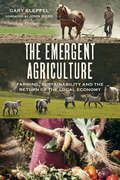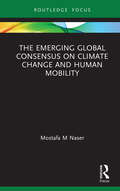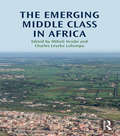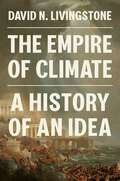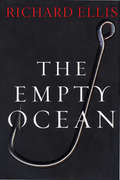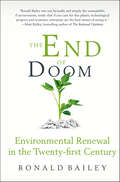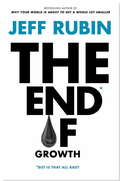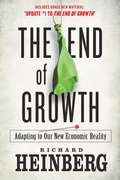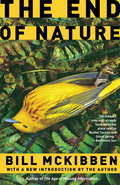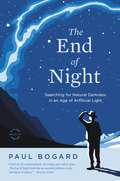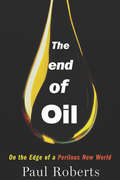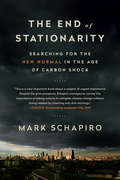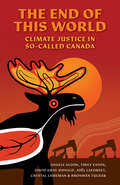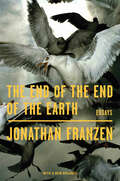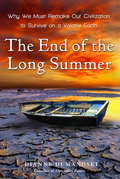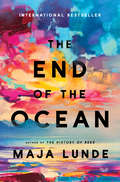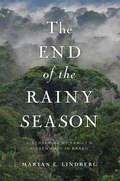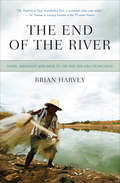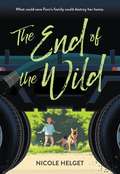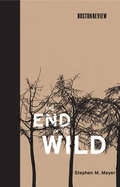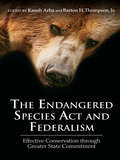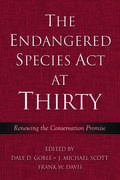- Table View
- List View
The Emergent Agriculture
by Gary Kleppel John IkerdLong embraced by corporations who are driven only by the desire for profit, industrial agriculture wastes precious resources and spews millions of tons of greenhouse gases into the atmosphere each year, exacerbating climate change and threatening the very earth and water on which we depend. However, this dominant system, from which Americans obtain most of their food, is being slowly supplanted by a new paradigm.The Emergent Agriculture is a collection of fourteen thematic essays on sustainability viewed through the lens of farming. Arguing that industrial food production is incompatible with the realities of nature, science, and ethics, this lyrical narrative makes the case for a locally based food system which is: Stable in the face of economic uncertainty Resilient in the face of environmental variability Grounded in stewardship of the land, on attaching value to food and the craft involved in producing it, and on respecting the dignity of farmers, consumer,s and livestockA revolution in food production is underway. Written from the vantage point of an ecologist who is also a farmer, The Emergent Agriculture is essential reading for anyone interested in food security and the potential for growing local economies. Food for thought about the future of food.Gary Kleppel is a professor of biology at the SUNY Albany, where he focuses on sustainable agriculture, conservation-based grazing, and the ecology of human-dominated landscapes. He and his wife Pam are owners of Longfield Farm, where they produce grass-fed lamb, wool, free range chickens and eggs, and artisanal breads.
The Emerging Global Consensus on Climate Change and Human Mobility (Routledge Focus on Environment and Sustainability)
by Mostafa M NaserThis book examines whether a global consensus is emerging on climate change and human mobility and presents evidence of a slow-moving but dynamic, step-by-step process of international policy development on climate-related mobility. Naser reviews the range of solutions offered to address climate-related mobility problems, such as extending the 1951 UN Refugee Convention, adopting an additional protocol to the UNFCCC or creating a new international treaty to support those facing climate-related migration and displacement problems. He examines the accumulating stock of international policies and initiatives relevant to climate-related mobility using a framework of six policy areas: human rights, refugees, climate change, disaster risk reduction, migration,and sustainable development. He uses this framework to define and summarise the main UN actions and milestones on climate-related mobility. Despite the difficult context affecting the global community of worsening climate change impacts and human rights under threat, Naser asserts that the foundations of global consensus on climate-related mobility have been built, particularly in the last decade. This book will be of great relevance to students, scholars and policy-makers with an interest in the increasing interface between climate change and human mobility policy issues.
The Emerging Middle Class in Africa
by Mthuli Ncube Charles Leyeka LufumpaThe emergence of the African middle class as a driver of Africa’s economic growth stands out as an important milestone in Africa’s contemporary economic history. This growth, though uneven, is a source of hope for Africa, but also a signal to the rest of the world on the prospects for economic recovery and renewal, particularly because it has been steady despite the global downturn. The Emerging Middle Class in Africa analyses specific aspects of the lives of the middle class in Africa. It looks at how people become and remain in the middle class through a series of thematic chapters. It examines how behaviour changes in the process, in terms of consumption patterns and spending on health and education. A further dimension of this analysis is how class impacts on gender relations and whether women are able to reap the same benefits of social advancement available to men. Africa is a continent of such scale and diversity that experiences across countries vary widely. The book thus captures the common patterns across the continent. This text is primarily aimed at Africanist researchers, policy makers, development practitioners, and bilateral and multilateral institutions, as well as students of African studies, political science, political economy, development studies, and development economics.
The Empire of Climate: A History of an Idea
by David N. LivingstoneHow the specter of climate has been used to explain history since antiquityScientists, journalists, and politicians increasingly tell us that human impacts on climate constitute the single greatest threat facing our planet and may even bring about the extinction of our species. Yet behind these anxieties lies an older, much deeper fear about the power that climate exerts over us. The Empire of Climate traces the history of this idea and its pervasive influence over how we interpret world events and make sense of the human condition, from the rise and fall of ancient civilizations to the afflictions of the modern psyche.Taking readers from the time of Hippocrates to the unfolding crisis of global warming today, David Livingstone reveals how climate has been critically implicated in the politics of imperial control and race relations; been used to explain industrial development, market performance, and economic breakdown; and served as a bellwether for national character and cultural collapse. He examines how climate has been put forward as an explanation for warfare and civil conflict, and how it has been identified as a critical factor in bodily disorders and acute psychosis.A panoramic work of scholarship, The Empire of Climate maps the tangled histories of an idea that has haunted our collective imagination for centuries, shedding critical light on the notion that everything from the wealth of nations to the human mind itself is subject to climate&’s imperial rule.
The Empty Ocean: Plundering The World's Marine Life
by Richard EllisIn The Empty Ocean, acclaimed author and artist Richard Ellis tells the story of our continued plunder of life in the sea and weighs the chances for its recovery. Through fascinating portraits of a wide array of creatures, he introduces us to the many forms of sea life that humans have fished, hunted, and collected over the centuries, from charismatic whales and dolphins to the lowly menhaden, from sea turtles to cod, tuna, and coral. Rich in history, anecdote, and surprising fact, Richard Ellis's descriptions bring to life the natural history of the various species, the threats they face, and the losses they have suffered. Killing has occurred on a truly stunning scale, with extinction all too often the result, leaving a once-teeming ocean greatly depleted. But the author also finds instances of hope and resilience, of species that have begun to make remarkable comebacks when given the opportunity. Written with passion and grace, and illustrated with Richard Ellis's own drawings, The Empty Ocean brings to a wide audience a compelling view of the damage we have caused to life in the sea and what we can do about it. "
The Encyclopedia of Cut Flowers: What Flowers to Buy, When to Buy Them, and How to Keep Them Alive Longer
by Calvert CraryFrom Calvert Crary and Bruce Littlefield, The Encyclopedia of Cut Flowers is a comprehensive, gorgeously visual guide that answers every question you've ever had (and a few you didn't know to ask!) about buying, caring for, and prolonging the lives of more than 140 different varieties of commonly available cut flowers.The Encyclopedia of Cut Flowers dives deep into the world of fresh-cut flowers, featuring unique entries for 143 different varieties of commonly available cut flowers that readers can buy at their local grocery store or flower market. Each flower entry offers authoritative tips for conditioning methods (eg–cut flowers should never be put near fresh fruit because fruit produces ethylene gas which will shorten the flowers' life), as well as scientific and common names, best seasons for buying (eg—lilies in spring, dahlias in summer) and fascinating facts about each bloom. An introductory section offers basic tips for styling arrangements at home, and for keeping flowers hydrated and alive for as long as possible. By the time readers are done flipping through the pages of The Encyclopedia of Cut Flowers, which features more than 150 gorgeous color photographs of flowers, they'll be experts in the field!
The End of Doom: Environmental Renewal in the Twenty-first Century
by Ronald BaileyIn the past five decades there have been many, many forecasts of impending environmental doom. They have universally been proven wrong. Meanwhile, those who have bet on human resourcefulness have almost always been correct. In his widely praised book Ecoscam, Ronald Bailey strongly countered environmentalist alarmism, using facts to demonstrate just how wildly overstated many claims of impending ecological doom really were. Now, twenty years later, the Reason Magazine science correspondent is back to assess the future of humanity and the global biosphere. Bailey finds, contrary to popular belief, that many present ecological trends are quite positive. Including: Falling cancer incidence rates in the United States. The likelihood of a declining world population by mid-century. The abundant return of agricultural land to nature as the world reaches peak farmland. A proven link between increases in national wealth and reductions in air and water pollution Global warming is a problem, but the cost of clean energy could soon fall below that of fossil fuels.In The End of Doom, Bailey avoids polemics and offers a balanced, fact-based and ultimately hopeful perspective on our current environmental situation. Now isn't that a breath of fresh air?
The End of Growth
by Jeff RubinIn an urgent follow-up to his best-selling Why Your World Is About To Get A Whole Lot Smaller, Jeff Rubin argues that the end of cheap oil means the end of growth. What it will be like to live in a world where growth is over? Economist and resource analyst Jeff Rubin is certain that the world's governments are getting it wrong. Instead of moving us toward economic recovery, measures being taken around the globe right now are digging us into a deeper hole. Both politicians and economists are missing the fact that the real engine of economic growth has always been cheap, abundant fuel and resources. But that era is over. The end of cheap oil, Rubin argues, signals the end of growth--and the end of easy answers to renewing prosperity. Rubin's own equation is clear: with China and India sucking up the lion's share of the world's ever more limited resources, the rest of us will have to make do with less. But is this all bad? Can less actually be more? Rubin points out that there is no research to show that people living in countries with hard-charging economies are happier, and plenty of research to show that some of the most contented people on the planet live in places with no-growth or slow-growth GDPs. But it doesn't matter whether it's bad or good, it's the new reality: our world is not only about to get smaller, our day-to-day lives are about to be a whole lot different.
The End of Growth: Adapting to Our New Economic Reality
by Richard HeinbergEconomists insist that recovery is at hand, yet unemployment remains high, real estate values continue to sink, and governments stagger under record deficits. The End of Growth proposes a startling diagnosis: humanity has reached a fundamental turning point in its economic history. The expansionary trajectory of industrial civilization is colliding with non-negotiable natural limits. Richard Heinberg's latest landmark work goes to the heart of the ongoing financial crisis, explaining how and why it occurred, and what we must do to avert the worst potential outcomes. Written in an engaging, highly readable style, it shows why growth is being blocked by three factors: Resource depletion Environmental impacts Crushing levels of debt These converging limits will force us to re-evaluate cherished economic theories and to reinvent money and commerce. The End of Growth describes what policy makers, communities, and families can do to build a new economy that operates within Earth's budget of energy and resources. We can thrive during the transition if we set goals that promote human and environmental well-being, rather than continuing to pursue the now-unattainable prize of ever-expanding GDP. Richard Heinberg is the author of nine previous books, including The Party's Over, Peak Everything, and Blackout. A senior fellow of the Post Carbon Institute, Heinberg is one of the world's foremost peak oil educators and an effective communicator of the urgent need to transition away from fossil fuels.
The End of Nature
by Bill MckibbenReissued on the tenth anniversary of its publication, this classic work on our environmental crisis features a new introduction by the author, reviewing both the progress and ground lost in the fight to save the earth.This impassioned plea for radical and life-renewing change is today still considered a groundbreaking work in environmental studies. McKibben's argument that the survival of the globe is dependent on a fundamental, philosophical shift in the way we relate to nature is more relevant than ever. McKibben writes of our earth's environmental cataclysm, addressing such core issues as the greenhouse effect, acid rain, and the depletion of the ozone layer. His new introduction addresses some of the latest environmental issues that have risen during the 1990s. The book also includes an invaluable new appendix of facts and figures that surveys the progress of the environmental movement.More than simply a handbook for survival or a doomsday catalog of scientific prediction, this classic, soulful lament on Nature is required reading for nature enthusiasts, activists, and concerned citizens alike.
The End of Night: Searching for Natural Darkness in an Age of Artificial Light
by Paul BogardA deeply panoramic tour of the night, from its brightest spots to the darkest skies we have left. A starry night is one of nature's most magical wonders. Yet in our artificially lit world, three-quarters of Americans' eyes never switch to night vision and most of us no longer experience true darkness. In THE END OF NIGHT, Paul Bogard restores our awareness of the spectacularly primal, wildly dark night sky and how it has influenced the human experience across everything from science to art. From Las Vegas' Luxor Beam--the brightest single spot on this planet--to nights so starlit the sky looks like snow, Bogard blends personal narrative, natural history, science, and history to shed light on the importance of darkness--what we've lost, what we still have, and what we might regain--and the simple ways we can reduce the brightness of our nights tonight.
The End of Oil: On the Edge of a Perilous New World
by Paul Roberts“A stunning piece of work—perhaps the best single book ever produced about our energy economy and its environmental implications” (Bill McHibbon, The New York Review of Books).Petroleum is so deeply entrenched in our economy, politics, and daily lives that even modest efforts to phase it out are fought tooth and nail. Companies and governments depend on oil revenues. Developing nations see oil as their only means to industrial success. And the Western middle class refuses to modify its energy-dependent lifestyle.But even by conservative estimates, we will have burned through most of the world’s accessible oil within mere decades. What will we use in its place to maintain a global economy and political system that are entirely reliant on cheap, readily available energy?In The End of Oil, journalist Paul Roberts talks to both oil optimists and pessimists around the world. He delves deep into the economics and politics, considers the promises and pitfalls of oil alternatives, and shows that—even though the world energy system has begun its epochal transition—we need to take a more proactive stance to avoid catastrophic disruption and dislocation.
The End of Stationarity: Searching for the New Normal in the Age of Carbon Shock
by Mark SchapiroScientists have devised a new term to explain the turmoil caused by climate change: the end of stationarity. It means that our baselines for rainfall, water flow, temperature, and extreme weather are no longer relevant--that making predictions based on past experience is no longer possible. But climate change has upended baselines in the financial world, too, disrupting the global economy in ways that are just becoming clear, leaving us unable to assess risk, and causing us to fundamentally re-think economic priorities and existing business models. At the heart of that financial unrest is the role of carbon, and as the world moves toward making more and more polluters pay to emit it, a financial mystery unfolds: What are the costs? Who has the responsibility to pay for them? Who do you pay? How do you pay? And how will those costs ripple through the economy? These are the questions veteran journalist Mark Schapiro attempts to answer as he illuminates the struggle to pinpoint carbon's true costs and allocate them fairly--all while bumping up against the vagaries of the free market, the lobbying power of corporations, the political maneuverings of countries, and the tolerance of everyday consumers buying a cup of coffee, a tank of gas, or an airplane ticket. Along the way, Schapiro tracks the cost of carbon through the drought-ridden farmland of California, the jungles of Brazil, the world's greatest manufacturing center in China, the carbon-trading center of Europe, and the high-tech crime world that carbon markets have inspired. He even tracks the cost of carbon through the skies themselves, where efforts to put a price tag on the carbon left by airplanes in the no-man's land of the atmosphere created what amounted to a quiet but powerful global trade war. The End of Stationarity deftly depicts the wild, new carbon economy, and shows us how nations, emerging and developed, teeter on its brink. Originally published in hardcover as Carbon Shock, the book is updated throughout and includes a new afterword, based on the Paris climate talks.
The End of This World: Climate Justice in So-Called Canada
by Emily Eaton Angele Alook David Gray-Donald Joël Laforest Crystal Lameman Bronwen TuckerThe climate crisis is here, and the end of this world—a world built on land theft, resource extraction, and colonial genocide—is on the horizon. In this compelling roadmap to a livable future, Indigenous sovereignty and climate justice go hand in hand. Drawing on their work in Indigenous activism, the labour movement, youth climate campaigns, community-engaged scholarship, and independent journalism, the six authors challenge toothless proposals and false solutions to show that a just transition from fossil fuels cannot succeed without the dismantling of settler capitalism in Canada. Together, they envision a near future where oil and gas stay in the ground; where a caring economy provides social supports for all; where wealth is redistributed from the bloated billionaire class; and where stolen land is rightfully reclaimed under the jurisdiction and sovereignty of Indigenous peoples. Packed with clear-eyed analysis of both short- and long-term strategies for radical social change, The End of This World promises that the next world is within reach and worth fighting for.
The End of the End of the Earth: Essays
by Jonathan FranzenFrom Jonathan Franzen, one of our preeminent writers and thinkers, comes a brilliant, searing essay collection that calls for us to take better care of our planet and one another in these troubled times.The End of the End of the Earth is a collection of Jonathan Franzen's essays and speeches from the past five years, in which he grapples with the most important and heated ethical subjects of the day: environmentalism, capitalism, wealth inequality, race, technology and the role of art. He challenges us to ask difficult questions: What is our civic responsibility in the face of climate change, the greatest ever threat to our planet and species? Does technology give us a sense of control or community or is it stripping these from us? Above all, in these essays, Franzen asks us to care--about causes great and small, with subjects as big as our planet and specific as a rare species of birds. These essays are in praise of empathy, and of the beauty and power of nature and art.This slim but powerful book is Franzen at his best, incisive, persuasive and compassionate.
The End of the End of the Earth: Essays
by Jonathan FranzenFrom Jonathan Franzen, one of our preeminent writers and thinkers, comes a brilliant, searing essay collection that calls for us to take better care of our planet and one another in these troubled times.The End of the End of the Earth is a collection of Jonathan Franzen's essays and speeches from the past five years, in which he grapples with the most important and heated ethical subjects of the day: environmentalism, capitalism, wealth inequality, race, technology and the role of art. He challenges us to ask difficult questions: What is our civic responsibility in the face of climate change, the greatest ever threat to our planet and species? Does technology give us a sense of control or community or is it stripping these from us? Above all, in these essays, Franzen asks us to care--about causes great and small, with subjects as big as our planet and specific as a rare species of birds. These essays are in praise of empathy, and of the beauty and power of nature and art.This slim but powerful book is Franzen at his best, incisive, persuasive and compassionate.
The End of the Long Summer: Why We Must Remake Our Civilization to Survive On A Volatile Earth
by Dianne DumanoskiFor the past twelve thousand years, Earth’s stable climate has allowed human civilization to flourish. But this long benign summer is an anomaly in the Earth’s history and one that is rapidly coming to a close. The radical experiment of our modern industrial civilization is now disrupting our planet’s very metabolism; our future hinges in large part on how Earth responds. Climate change is already bearing down, hitting harder and faster than expected. The greatest danger is not extreme yet discrete weather events, such as Hurricane Katrina or the calamitous wildfires that now plague California, but profound and systemic disruptions on a global scale. Contrary to the pervasive belief that climate change will be a gradual escalator ride into balmier temperatures, the Earth’s climate system has a history of radical shifts–dramatic shocks that could lead to the collapse of social and economic systems. The question is no longer simply how can we stop climate change, but how can we as a civilization survive it. The guiding values of modern culture have become dangerously obsolete in this new era. Yet as renowned environmental journalist Dianne Dumanoski shows, little has been done to avert the crisis or to prepare human societies for a time of growing instability. In a work of astonishing scope, Dumanoski deftly weaves history, science, and culture to show how the fundamental doctrines of modern society have impeded our ability to respond to this crisis and have fostered an economic globalization that is only increasing our vulnerability at this critical time. She exposes the fallacy of banking on a last-minute technological fix as well as the perilous trap of believing that humans can succeed in the quest to control nature. Only by restructuring our global civilization based on the principles that have allowed Earth’s life and our ancestors to survive catastrophe——diversity, redundancy, a degree of self-sufficiency, social solidarity, and an aversion to excessive integration——can we restore the flexibility needed to weather the trials ahead. In this powerful and prescient book, Dumanoski moves beyond now-ubiquitous environmental buzzwords about green industries and clean energy to provide a new cultural map through this dangerous passage. Though the message is grave, it is not without hope. Lucid, eloquent, and urgent,The End of the Long Summerdeserves a place alongside transformative works such asSilent SpringandThe Fate of the Earth. From the Hardcover edition.
The End of the Ocean: A Novel
by Maja Lunde“Two stories on the impact of climate change intersect in this thoughtful and suspenseful novel. . . . convincingly detailed and quietly wrenching . . . powerful.” —Kirkus Reviews, starred reviewFrom the author of the number-one international bestseller The History of Bees, a captivating story of the power of nature and the human spirit that explores the threat of a devastating worldwide drought, witnessed through the lives of a father, a daughter, and a woman who will risk her life to save the future.In 2019, seventy-year-old Signe sets sail alone on a hazardous voyage across the ocean in a sailboat. On board, a cargo that can change lives. Signe is haunted by memories of the love of her life, whom she’ll meet again soon.In 2041, David and his young daughter, Lou, flee from a drought-stricken Southern Europe that has been ravaged by thirst and war. Separated from the rest of their family and desperate to find them, they discover an ancient sailboat in a dried-out garden, miles away from the nearest shore. Signe’s sailboat.As David and Lou discover Signe’s personal effects, her long ago journey becomes inexorably linked to their own.An evocative tale of the search for love and connection, The End of the Ocean is a profoundly moving father daughter story of survival and a clarion call for climate action.“Lyrical, atmospheric, and eerily prescient . . . Lunde expertly weaves together both a warning and a gorgeous literary work of love and survival that will leave you wishing for rain.” Christina Dalcher, Sunday Times–bestselling author of Vox“Gripping and powerful.” —Sam J. Miller, Nebula award–winning author
The End of the Rainy Season: Discovering My Family's Hidden Past in Brazil
by Marian LindbergMarian Lindberg grew up being told that Walter Lindberg, the man who raised her father, was a brave explorer who had been murdered in the Amazon. She took her father's claims at face value, basking in her exotic roots, until she started to notice things. The unverified legend became a riddle she couldn't solve.As Lindberg moved from journalism to law, fell in love, and sought a family of her own, her father repeatedly interfered. He had a closed vision of his family, and she-unlike the silent Walter-was breaking out. Yet her father's story of the past haunted Lindberg. Long after her father's death, Lindberg set off for the Amazon, determined to find out the truth about Walter. Aided by generous Brazilians who adopted her search as if it were their own, she discovered as much about herself and her family as about Walter, whose true role in Brazil's history turned out to be unexpected and deeply troubling.Sharply observant, wrought with honesty, and sweeping in its ambitions, The End of the Rainy Season is a powerful examination of identity and human relationships with nature, and between one another.
The End of the River: Dams, Drought and Déjà Vu on the Rio São Francisco
by Brian Harvey&“[Harvey] may have created a new literary genre: science travel writing . . . travelogue, autobiography, history, and even fantasy romp alongside the biology&” (Quill & Quire). When biologist Brian Harvey saw a thousand fish blundering into a Brazilian dam, he asked the obvious: What&’s going to happen to them? The End of the River is the story of his long search for an answer. Harvey takes readers from a fisheries patrol boat on the Fraser River to the great Tsukiji fish market in Japan, with stops in the Philippines, Thailand, and assorted South American countries. Finally, in the arid outback of northeast Brazil, against a backdrop of a multi-billion-dollar river project nobody seems to want, he finds a small-scale answer to his simple question. In recounting his journey, he populates his story with characters both real and imagined, human and otherwise—a six-foot endangered catfish; a Canadian professor with a weakness for Thai bar girls; a chain-smoking Brazilian with a passion for her river; a drug-addled stick-up artist. The End of the River is about fishermen, fish farmers, and fish cops; there are scientists and shysters as well as a few Colombian narcotráficos and some very drunk, very hairy Brazilian men in thongs. From the founder of the World Fisheries Trust, Harvey introduces a new kind of writing about the environment, as far off the beaten track as you can get in a Land Rover driven by a female Colombian biologist whose favorite expression is &“No hay via!&”—meaning, &“no road!&” &“[A] freewheeling and vividly written essay on the mysteries and longings of what it is to be human in a world of cynicism and loss—and more significantly, what it is to be hopeful, to persevere, in the search for redemption and beauty . . . A brilliant and instructive book . . . recalls the travel writing of one of Harvey&’s heroes, Sir Richard Burton.&” —The Globe and Mail (Toronto)
The End of the Wild
by Nicole HelgetA modern, beautifully written story set against the backdrop of the controversial issue of fracking that explores the timely themes of poverty, environmental protection, what makes a family, and finding your place in the world.Eleven-year-old Fern's rundown home borders a pristine forest, where her impoverished family hunts and forages for food. It's also her refuge from the crushing responsibility of caring for her wild younger brothers and PTSD-stricken stepfather. But when a fracking company rolls into town, Fern realizes that her special grove could be ripped away, and no one else seems to care.Her stepfather thinks a job with the frackers could help pull the family out of poverty. Her wealthy grandfather--who wants to take custody of Fern and her brothers--likes the business it brings to his manufacturing company. Facing adversity from all sides, can one young girl make a difference in the fate of her family and their way of life?
The End of the Wild
by Stephen M. MeyerToday the guiding hand of natural selection is unmistakably human. With these words Stephen M. Meyer begins a stunningly clear-eyed view of the extinction crisis. Marshaling evidence from the last ten years of research, he argues that nothing-not national or international laws, global bioreserves, local sustainability schemes, or "wildlands"-will change the course we have set: the loss of half of the earth's species by the end of the century. We will come to share the planet only with species that thrive in human-dominated environments.
The End of the Wild (Boston Review)
by Stephen M. MeyerA wake-up call that argues that although it may be too late to save biodiversity, we can take steps to save our ecosystems. With the extinction rate at 3000 species a year and accelerating, we can now predict that as many as half of the Earth's species will disappear within the next 100 years. The species that survive will be the ones that are most compatible with us: the weedy species—from mosquitoes to coyotes—that thrive in continually disturbed human-dominated environments. The End of the Wild is a wake-up call. Marshaling evidence from the last ten years of research on the environment, Stephen Meyer argues that nothing—not national or international laws, global bioreserves, local sustainability schemes, or "wildlands"—will change the course that has been set. Like it or not, we can no longer talk about conserving nature, only managing what is left. The race to save biodiversity is over. But that doesn't mean our work is over. The End of the Wild is also a call to action. Without intervention, the surviving ecosystems we depend on for a range of services—including water purification and flood and storm damage contro—could fail and the global spread of invasive species (pests, parasites, and disease-causing weedy species) could explode. If humanity is to survive, Meyer argues, we have no choice but to try to manage the fine details. We must move away from the current haphazard strategy of protecting species in isolation and create trans-regional "meta-reserves," designed to protect ecosystem functions rather than species-specific habitats.
The Endangered Species Act and Federalism: Effective Conservation through Greater State Commitment
by Jr. Barton H. Thompson Kaush ArhaStates today play a major role in implementing and enforcing environmental laws such as the Clean Air Act, Clean Water Act, and the Resource Conservation and Recovery Act. A thirty year review of ESA identified state leadership in species conservation as a necessary element in better conserving the nation‘s imperiled species, yet the theoretical and practical reasons and applications of an enhanced state role are little understood and have not been subjected to any meaningful analysis. This book, for the first time, presents the legal and policy analysis for federalism considerations in implementing ESA. The book undertakes a comprehensive analysis of the economic rationale for federalism in ESA administration; compares administration of ESA to other major environmental statutes; reviews various tools under the existing Act to enhance state role in species conservation; evaluates major case studies to determine roles the state can play in species conservation and recovery; and concludes with policy recommendations to encourage greater state involvement in species conservation.
The Endangered Species Act at Thirty: Renewing the Conservation Promise
by Dale D. Goble J. Michael Scott Frank W. DavisThe Endangered Species Act at Thirty is a comprehensive, multidisciplinary review of issues surrounding the Endangered Species Act, with a specific focus on the act's actual implementation record over the past thirty years. The result of a unique, multi-year collaboration among stakeholder groups from across the political spectrum, the two volumes offer a dispassionate consideration of a highly polarized topic. Renewing the Conservation Promise, Volume 1, puts the reader in a better position to make informed decisions about future directions in biodiversity conservation by elevating the policy debate from its current state of divisive polemics to a more-constructive analysis. It helps the reader understand how the Endangered Species Act has been implemented, the consequences of that implementation, and how the act could be changed to better serve the needs of both the species it is designed to protect and the people who must live within its mandates. Volume 2, which examines philosophical, biological, and economic dimensions of the act in greater detail, will be published in 2006. As debate over reforming the Endangered Species Act heats up in the coming months, these two books will be essential references for policy analysts and lawmakers; professionals involved with environmental law, science, or management; and academic researchers and students concerned with environmental law, policy, management, or science.
